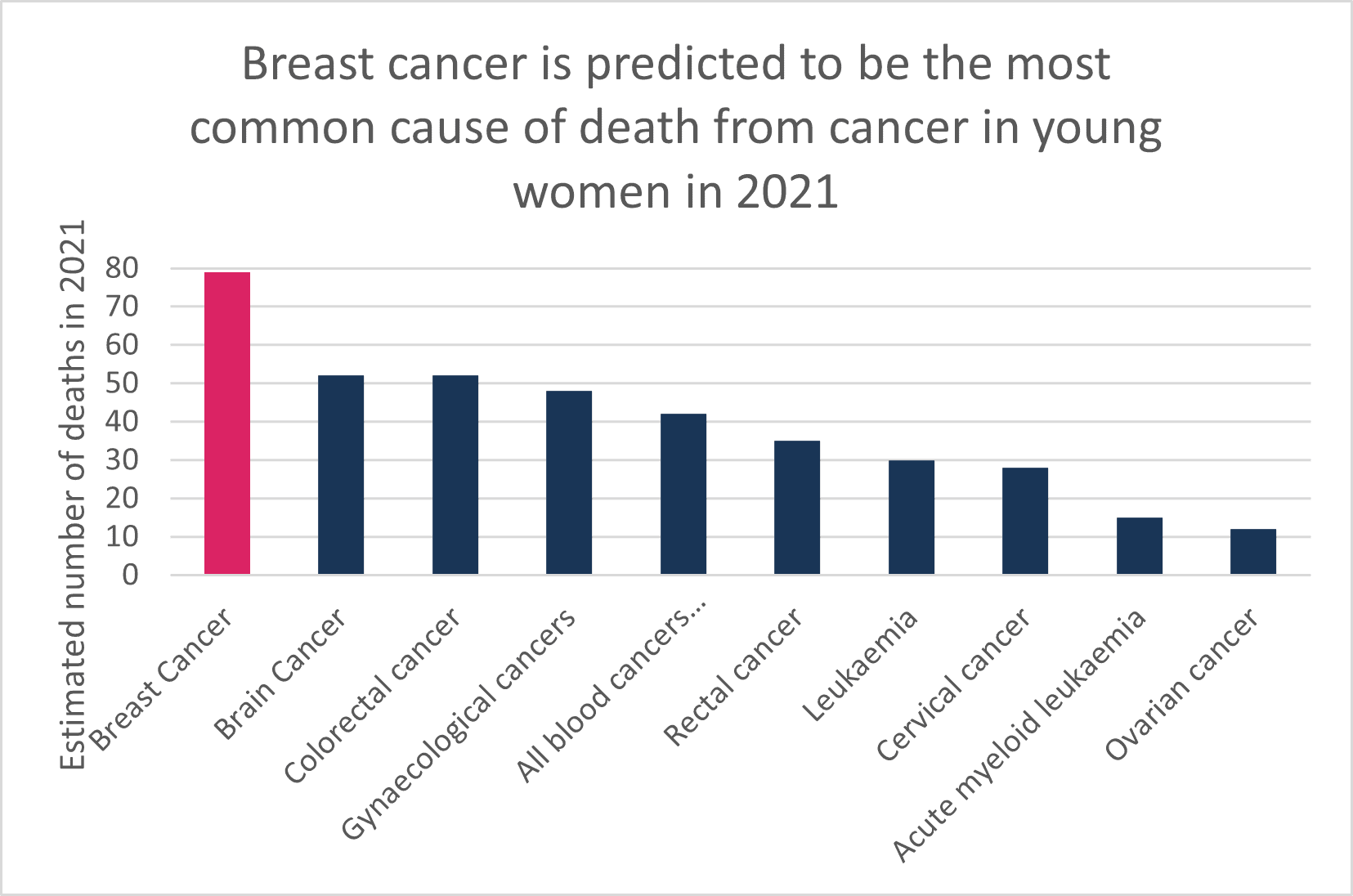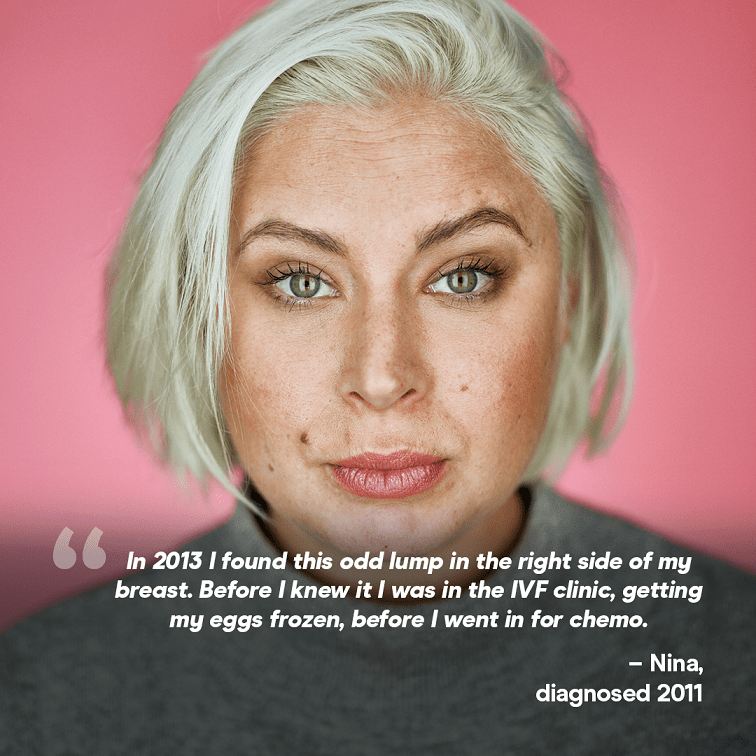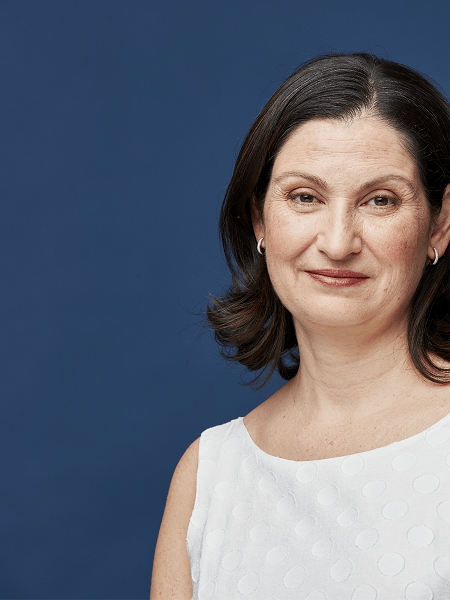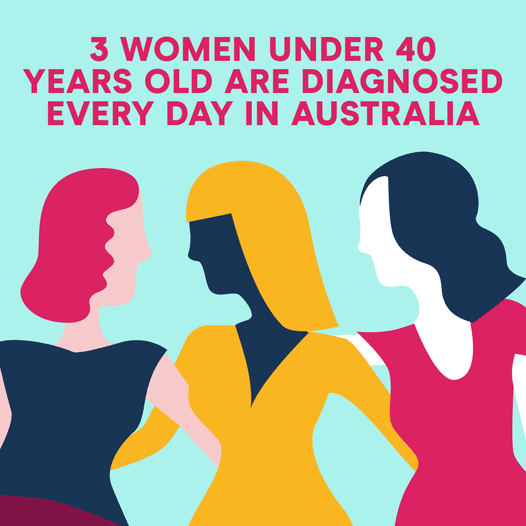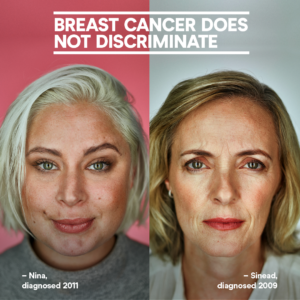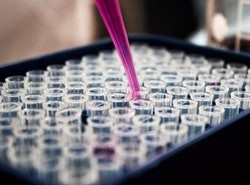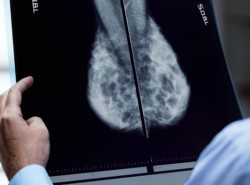
Breast Cancer in Young Women
Table of Content
It is estimated that in 2023 around 1000 young women will be diagnosed with breast cancer in Australia and 79 are estimated to die from this disease. That’s about 3 women under 40 years old diagnosed every day and more than 1 dying each week.
Whilst these numbers may seem small compared to women aged 40 and over, breast cancer is the most commonly diagnosed cancer in young women in Australia, and also the most common cause of cancer deaths.
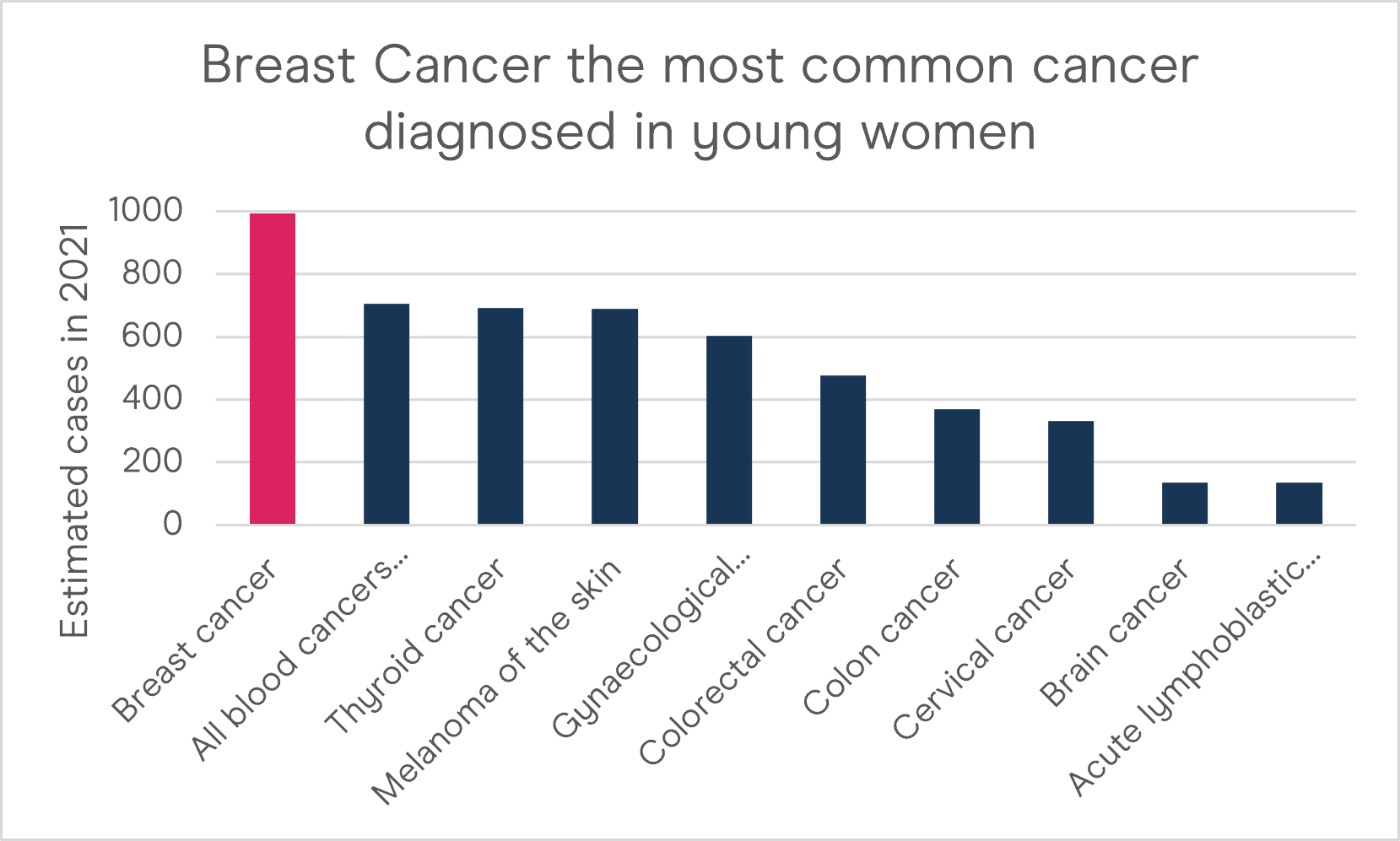
Source: Australian Institute of Health and Welfare (AIHW) 2021 Cancer Data in Australia; Canberra: AIHW.
Overall, the 5-year survival rate in young women is lower compared to women aged 40 and over. In 2013-2017 the relative 5-year survival rate in women aged 20-39 was 89.6%, compared to women aged 40-59 years was 93.4%.
Young women are also more likely to be diagnosed with more aggressive breast cancers, like triple-negative breast cancer.
Nina’s story

DONATE TO LIFE-SAVING RESEARCH TODAY
Common breast cancer issues affecting young women
While breast cancer in women under 40 is relatively uncommon, the impact of the disease on a young woman’s life is devastating. Young women face a unique set of practical, physical and emotional challenges, including:
Employment, Financial and Career
A diagnosis of breast cancer is often difficult for a young woman to communicate in the workplace. It can have a detrimental effect on a young woman’s career progression and future earning potential. Extended periods of time off work during the early stages of a career can negatively impact on professional development, resulting in lost opportunities for career advancement and pay rises. Breast Cancer Network Australia have further resources to provide emotional and practical support for people affected by cancer, including information and personal stories about young women with breast cancer.
The impact of treatment on fertility, early menopause and pregnancy
The impact of chemotherapy on fertility depends on a number of factors, including the woman’s age and the type of drugs she receives. The effects experienced can also vary among different women of the same age.
Treatment with hormonal therapies (endocrine therapies) do not cause a woman to become infertile. However, a woman’s fertility may decrease while taking hormonal therapies. Most hormonal therapies for breast cancer are given for 5 years to prevent cancer recurrence. After 5 years, it is possible that a woman’s fertility may have decreased naturally.
Treatments for breast cancer may reduce fertility temporarily or permanently. However, this does not mean it is impossible to become pregnant during or after treatment. For example, although hormonal therapies for breast cancer can cause menstrual periods to stop, this does not necessarily mean that a woman cannot become pregnant while taking hormonal therapies. Women who are sexually active while taking tamoxifen should use effective contraception if they do not wish to become pregnant during this time.
Women who are pregnant when their breast cancer is diagnosed may not be recommended some of treatments given to non-pregnant patients. Radiotherapy is not recommended because it may harm the unborn baby, however radiotherapy can be given after birth. Chemotherapy is not recommended during the first trimester because it may harm the unborn baby, with treatment often given during the second and third trimesters. Hormonal therapy and trastuzumab (Herceptin®) are not recommended while pregnant.
Physical burden of breast cancer
Issues faced by young women due breast cancer treatments may include fatigue, sleep problems, weight gain, issues with cardiovascular health and reduction in bone mineral density.
We need your help – New Treatments To Prevent Infertility in Young Women DIagnosed with Breast Cancer
Problem: Chemotherapy can permanently damage the ovaries leading to low estrogen levels, early menopause and eventually infertility. The impact of new cancer treatments on ovarian health is not well investigated. Early menopause places women at increased risk of osteoporosis, heart disease, cognitive dysfunction and premature mortality. Around 7% of breast cancer diagnoses are in young women that have not started or completed their families, and early menopause and infertility are among their major concerns.
Goal: Address these concerns by determining whether promising new breast cancer treatments, like Olaparib or immunotherapy can damage the ovaries and/or reduce estrogen levels and therefore impact a women’s ability to fall pregnant.
DONATE NOW TO HELP FUND THIS RESEARCH
Psychological burden of breast cancer
The physical changes to the body that occur as a result of breast cancer treatment can have a significant effect on a young woman’s sexuality, intimacy, self-image, and self-esteem. Breast cancer treatments can lead to vaginal dryness or weight gain which can lead to feelings such as loss of femininity and sexual attractiveness.
Receiving a diagnosis of breast cancer at a young age is not only a shock for the woman, but for their loved ones as well (family members, partners). Young women often report feeling socially isolated or alone during and after their breast cancer treatment – even if they are surrounded by supportive family and friends. There are a range of online resources available for young women, such as BCNA’s discussion board connecting young women diagnosed. Breast Cancer Network Australia have further resources to provide emotional and practical support for people affected by cancer, including information and personal stories about young women with breast cancer.
Fear of recurrence is the fear that breast cancer could return in the breast, or in another part of the body. This affects any woman diagnosed with breast cancer. However, young women must live much longer with this fear. Even following successful treatment from breast cancer, many of those affected live with an ongoing fear that their cancer will return. This fear can be debilitating and can lead to anxiety, depression and reduced quality of life. BCNA’s online network or confidential helpline 1800 500 258 may be useful resources for those experiencing anxiety around this.
Tina’s story
“As an 11 year survivor the fear of reoccurrence is real and constant. Many times the fear overtakes my ability to do basic things and it has led to anxiety and depression (at its worst). ConquerFear will be a great tool for people diagnosed with cancer to tap into and use the strategies to control their fears and anxieties and focus on our goals and daily living.” Tina, diagnosed 2008
DONATE TO IMPROVE OUTCOMES FOR THOSE IMPACTED BY BREAST CANCER
Risk factors for young women
All women are at risk of developing breast cancer and the risk greatly increases with age with most cases of breast cancer occurring in women over the age of 50. There are a range of factors that can increase breast cancer risk in young women. The causes of breast cancer in young women can include lifestyle factors (such as alcohol consumption) and non-lifestyle factors (such as genetics). Young women may have an increased risk of breast cancer due to factors such as:
- Family history – A history of breast cancer among relatives is a strong risk factor for young women. A young woman’s risk of breast cancer is increased if a close relative, like a mother or aunt, has had breast or ovarian cancer. A young woman’s risk is further increased by the number of relatives affected and if her relatives were diagnosed with cancer at a young age
- Genetic susceptibility – A high proportion of young women diagnosed with breast cancer have inherited mutations in their BRCA1 or BRCA2 genes (or gene mutations).
- Reproductive and hormonal factors- Early menarche (age at first period) increases the risk of breast cancer, and giving birth to the first child at a late age also increases risk.
- Alcohol intake – Regularly drinking alcohol can increase the risk of breast cancer for women of all ages. The risk of breast cancer rises as the number of drinks regularly consumed increases. Currently, there does not appear to be a ‘safe’ level of regular alcohol consumption.
Understanding the risk factors for breast cancer and being breast aware is vital for the early detection of breast cancer in young women. Earlier detection means more treatment options, a much higher chance of survival and an increased quality of life for women at all ages. If you are concerned that you may have an increased risk of breast cancer, please speak with your GP or local family cancer clinic, who will help you assess your risk and refer you for further genetic testing if needed. You may also be recommended other risk-reducing strategies such as keeping a healthy weight, earlier screening and risk-reducing surgeries/medications.
Detection and diagnosis of breast cancer in young women
Organised breast cancer screening aims to detect breast cancers at an early stage in women. In Australia, population-based screening is performed by BreastScreen Australia and involves mammograms (an x-ray of the breast). As there is currently insufficient evidence that mammography is an effective nation wide breast cancer screening strategy for young women, routine breast screening for under 40s is not offered.
An effective method for early detection of breast cancer in young women is breast awareness. Women of all ages should become aware of how their breasts normally look and feel, and to report any new or unusual changes) to their general practitioner without delay.
See here for breast cancer symptoms.
Young women classified as being at high risk of developing breast cancer should discuss an individual routine screening program with their general practitioner. Breast imaging use to investigate breast symptoms or for surveillance of young women may include breast ultrasounds, breast mammograms and breast MRIs.
Frequently Asked Questions about breast cancer in young women
A: Although it is extremely rare, four women under the age of 20 were diagnosed with breast cancer in Australia in 2020. (making up 0.02% or less than 1% of all new cases diagnosed in women). Breast cancer is more common in women over 50.
A: Breast cancer in teenagers (0-19 years) is extremely rare with only four cases reported in Australia in 2020. In 2020 in Australia 19,807 women were diagnosed with breast cancer, 99 were in their 20s and 889 were in their 30s. Although teenagers may experience lumps when their breasts develop, these are more than likely to be ‘benign’, meaning they’re harmless. If you are concerned, talk to your GP or local family cancer clinic.
A: Yes. Although it is uncommon, it is possible for women in their 20s to get breast cancer. In 2020, 99 women aged between 20-29 were diagnosed with the disease in Australia, making up less than 1% of all women diagnosed.
A: It is important that young women know the changes in their breasts that could indicate the presence of breast cancer. One of the most effective methods of early detection of breast cancer for young women is being breast aware, knowing the feel and look of their breast so any new or unusual change can be detected. Common changes that could be due to breast cancer include:
a lump or thickening in the breast, especially if it’s only in one breast
a change in the shape or size of the breast or nipple
dimpling of the skin or the nipple
discharge or blood from the nipple
a rash or changes to the skin around the breast
persistent pain in the breast or armpit
swelling or a lump in the armpit.
These changes do not necessarily mean a young woman has breast cancer. However, if a young woman notices these, or any other, changes in the breast, she should see her doctor. See here for more information on breast cancer symptoms.
A: For healthy young women at average risk of developing breast cancer, the best methods for the early detection of the disease are:
Breast awareness. Young women should be aware of the normal look and feel of their breasts so that they can spot any changes.
Clinical breast examination (i.e. breast check by a doctor). Young women can request regular breast checks with their doctor.
See here for more information on breast cancer symptoms.
A: For young women, managing a life-threatening diagnosis on top of dealing with major life events can be devastating; news of an unexpected breast cancer diagnosis may leave some women feeling anxious, overwhelmed, scared and upset. Breast Cancer Network Australia have further resources to provide emotional and practical support for people affected by cancer, including information and personal stories about young women with breast cancer. NBCF has also compiled a report to help young women diagnosed with breast cancer.
A: Because of the disproportionate burden of breast cancer on young women’s lives, NBCF is continuing to fund a number of research projects related to breast cancer in young women. These projects cover a broad research spectrum – including understanding risk factors and cancer spread (metastasis), developing an educational tool to make informed treatment choices, improving treatment options for triple-negative breast cancer (which is more likely to affect younger women) and developing better screening methods for the detection of tumours in dense breast tissue.
Below are some of the NBCF funded researchers that focused on developing better screening for women with dense breasts. Young women are more likely to have dense breast which can impact the ability of a mammogram to detect tumours.
Towards better breast screening for Australian women
Using ‘risk scores’ to accurately predict breast cancer during breast screening
Digitising breast cancer screening
Supporting the successful trial of enhanced breast screening
